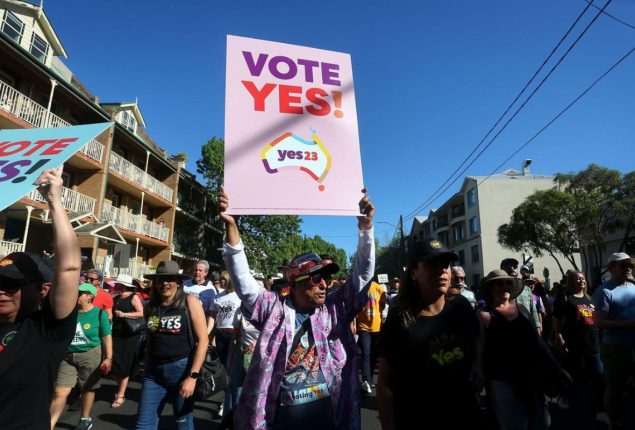New Zealand Elections: Right-Wing Wave Sweeps Ruling Party
New Zealand's Prime Minister Chris Hipkins concedes election defeat. National Party, led...

Australian Referendum Polls Close Amid Early Failure Hints
Polls have largely concluded in the Australian referendum that holds profound implications for the nation’s relationship with its First Nations people in the foreseeable future.
The initial results, as reported by the Australian Electoral Commission (AEC), indicate a potential setback for the proposed constitutional amendment.
This referendum posed the question of endorsing a constitutional change to formally acknowledge Aboriginal and Torres Strait Islanders and establish a representative body, known as the Voice to Parliament, to advise the government on Indigenous matters.
While Prime Minister Anthony Albanese deemed it a ‘simple proposition,’ the months leading up to the vote unveiled a complex blend of opposition and indifference towards the proposal.
To succeed, the Voice required a majority ‘Yes’ vote both nationwide and in a minimum of four out of six states – an achievement accomplished in only eight out of 44 referendums since 1906, when the first one took place.
The most recent successful referendum was back in 1977, a time predating the internet’s introduction in Australia and the emergence of social media, which has contributed to the polarization of debate and the rapid spread of misinformation concerning this referendum.
Just two days before the polls closed, a YouGov survey of over 1,500 potential voters showed a substantial lead for the ‘No’ side, with an 18-point advantage – 56% to 38%, leaving the rest undecided. Australia enforces compulsory voting, so a high turnout was anticipated.
An unprecedented 17.6 million individuals were anticipated to participate in the vote, and the outcome was slated for announcement shortly after the polls closed on Saturday.
The prime minister had invested deeply in this campaign, viewing it as a personal undertaking. Just this week, he revisited Uluru, the colossal rock formation at the heart of the country, where Indigenous leaders, in 2017, concurred on pursuing constitutional acknowledgment.
Seated on the ground, he held hands with Indigenous women, and as they sang a traditional song, his eyes brimmed with tears.
“This is a campaign about love for our fellow Australians, and about respect,” Albanese said. “But it’s also about love of ourselves, whether we have the courage to love what Australia is. It isn’t something that began when a few ships came in 1788. This is Australia, that fullness and richness of our history.”
During the campaign’s closing days, proponents of the ‘Yes’ vote reinforced their message, issuing statements that encouraged individuals to prioritize “love over manipulation” and using text messages that emphasized the importance of winning “people’s affections and convictions.”
Noted Indigenous leader Noel Pearson, who played a pivotal role in advocating for constitutional amendments, conveyed in a September address to the National Press Club that the most compelling incentive for supporting the ‘Yes’ vote was a profound “patriotic love.”
“It is not the love of each other that joins us, it is our mutual love of country … we don’t need mutual affection to succeed in this referendum,” said Pearson.
To stay informed about current events, please like our Facebook page https://www.facebook.com/BOLUrduNews/.
Follow us on Twitter https://twitter.com/bolnewsurdu01 and stay updated with the latest news.
Subscribe to our YouTube channel https://bit.ly/3Tv8a3P to watch news from Pakistan and around the world.
Catch all the International News, Breaking News Event and Latest News Updates on The BOL News
Download The BOL News App to get the Daily News Update & Follow us on Google News.